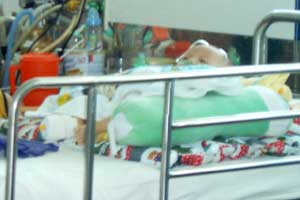Dr. Pham Thi Ngoc Tuyet from the Gastroenterology Department of Children’s Hospital No. 2 in Ho Chi Minh City states that diarrhea is one of the top 10 diseases with the highest incidence in children in Vietnam. The primary cause of this condition is children consuming contaminated food due to improper storage.
 |
|
Children receiving inpatient treatment at the hospital. (Photo: VNE) |
Additionally, according to Dr. Tuyet, factors such as irregular eating habits, excessive protein content in food, and high levels of pesticides used on fruits and vegetables also contribute to the onset of diarrhea in children.
A study conducted at Children’s Hospital No. 2 confirmed that the rate of children hospitalized for diarrhea is significantly high compared to other diseases. This rate has remained relatively stable over the years, with nearly 7,000 pediatric patients admitted annually for diarrhea. Over 90% of these cases come from suburban districts, accounting for 30% of inpatient beds. The age group most affected is children under three years old.
Most children are admitted early, within the first three days of onset, presenting with fewer than six bowel movements per day. They typically arrive at the hospital with symptoms of fever, vomiting, weight loss, dehydration, and diarrhea…
A child with diarrhea requiring hospitalization usually stays for an average of about five days. Over 20% of hospitalized children remain for more than seven days. Factors influencing the duration of hospitalization include the use of antibiotics, intravenous fluids, bronchitis, pneumonia, dehydration, hypokalemia, and infections in other organs, with upper respiratory infections and bronchopneumonia being the most common.
In medical terms, diarrhea is defined as having loose and watery stools, with more than three bowel movements per day. In the past, when pediatric patients with acute diarrhea arrived at the hospital, they not only received standard resuscitation measures but also antibiotics for treatment.
“However, in many cases, the use of antibiotics by physicians is not justified, leading to prolonged carrier status and extended hospital stays for the patients. Most antibiotics tend to have side effects. While these medications can eliminate pathogens, they also destroy beneficial symbiotic bacteria in the body. The more irrational the use, the greater the side effects,” explained Dr. Tuyet.
Tests at Children’s Hospital No. 2 indicate that the majority of children suffering from diarrhea are not due to bacterial infections, followed by viral infections. The identification of the causative agent is often limited due to technical constraints in microbiological methods. Current diagnostic orientation can only be based on clinical manifestations such as fever, diarrhea, and a decline in health…
Recently, researchers have suggested that changes in the composition and characteristics of stools during illness are more critical than the frequency of bowel movements. This finding impacts the decision-making process regarding the use of antibiotics in treatment. A new type of antibiotic (Probiotic) tested on over 600 hospitalized children with acute diarrhea has shown excellent results, such as reducing the duration of illness and treatment time, and it also has the potential to prevent gastrointestinal disorders caused by antibiotic use. “This is significant in helping patients recover quickly and reducing the risk of malnutrition. The greatest risk of the disease is causing malnutrition in children,” Dr. Tuyet assessed.
Nevertheless, according to physicians, diarrhea can be simply treated by replenishing fluids and electrolytes. Only cases where children show signs of infection require additional antibiotics as directed by a doctor.
The age group most affected is under three years old. The younger the child, the higher the risk of severe and prolonged illness. Therefore, doctors advise parents to take their child for examination if they have watery stools for more than six hours, or if, in addition to diarrhea, the child is also experiencing vomiting or fever… Do not self-medicate with anti-nausea or anti-diarrheal medications, as this may lead to bloating, difficulty breathing, or lethargy due to medication side effects.
My Lan


















































